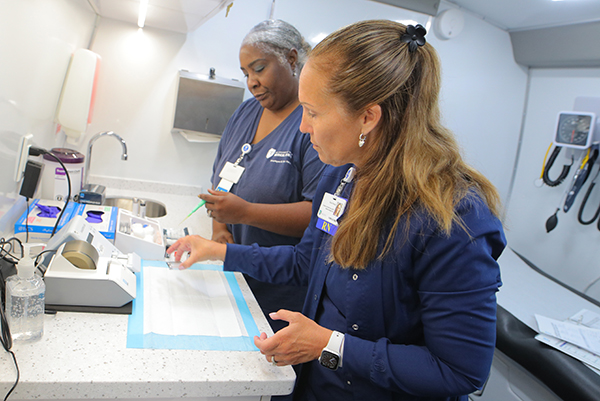Having high blood pressure raises a person’s risk for a number of serious health problems, including heart attacks and strokes.
But as many as one-third of American adults with high blood pressure aren’t even aware they have it. Current guidelines put healthy blood pressure readings at less than 120/80, with hypertension defined as blood pressure at or above 130/80.

Kim Steele, right, the lead nurse for UToledo Health’s mobile health, and licensed practical nurse Gloria Johnson prepare testing equipment before seeing patients in the UToledo Health mobile health unit outside the Mott branch library. The mobile clinic will be at the Mott library the first and third Wednesdays of the month.
However, most people won’t experience symptoms even if their blood pressure is significantly higher than that.
“You can be walking around with a blood pressure of 160, even 170, and have no idea,” said Dr. Hoda Shabpiray, a UToledo Health internal medicine specialist. “Over time, that can be very damaging. That’s why it’s so important to get checked. Hypertension is treatable, but we can’t treat you if it hasn’t been diagnosed.”
Shabpiray is the medical director of the new UToledo Health mobile health unit, which provides free preventative health screenings — like checking blood pressure — to underserved communities throughout northwest Ohio.
In addition to blood pressure screenings, the 37-foot-long custom-built mobile clinic is equipped to test blood glucose, A1C and cholesterol.
The idea, Shabpiray said, is to catch common but troubling conditions before they can cause significant health problems. Untreated diabetes, for example, can lead to kidney disease, cardiovascular disease and vision loss. High cholesterol can lead to heart attacks and strokes.
The only way to know that you have those conditions is to be screened. But too many people haven’t been tested.
Survey after survey has found that a significant portion of the U.S. population lacks access to primary care medical services where patients get those kinds of routine tests.
“Some patients may not have transportation, some may not be able to get time off work, some may have financial barriers, including a lack of insurance, and others may have limited healthcare options in their neighborhoods,” Shabpiray said. “Whatever the reason someone hasn’t had access, it’s critically important we’re able to reach them and help get them on a path to better health.”
In addition to screenings, UToledo Health clinicians and staff will provide health education and help connect patients with a primary care provider for follow up if they don’t have an existing relationship with one. They can also connect patients with UToledo Health social workers who can help individuals better navigate the healthcare system.
“People are so busy in their lives that they don’t always think about their health. We want health to be a priority,” she said. “We want our services to be easy and approachable. We’re going to be out in the community, providing a friendly reminder that your health is important, and we can help you have a healthier, longer life, starting with some simple tests.”
The mobile health unit, which is based on a Ford F-550 and staffed by an experienced UToledo Health registered nurse, has two exam rooms, a restroom and a small waiting room on board. The vehicle was purchased and built with federal Community Project Funding secured by U.S. Rep. Marcy Kaptur through the Health Resources and Services Administration.
Additional support for the clinic was provided by Anthem Blue Cross Blue Shield.
The new mobile clinic is UToledo Health’s first and contributes to its goal of expanding access to high-quality medical care.
Shabpiray expects the mobile clinic to become a fixture at events throughout Toledo and the greater northwest Ohio region.
UToledo Health already has established a regular rotation for the mobile clinic to visit six separate Toledo Lucas County Public Library branches two times a month.
The mobile unit will be at the Sanger branch the first and third Mondays of month; the Heatherdowns branch the first and third Tuesdays of the month; the Mott branch the first and third Wednesdays of the month; the Kent branch the second and fourth Mondays of the month; the Oregon branch the second and fourth Tuesdays of the month; and the Holland branch the second and fourth Wednesdays of the month.
Though the mobile clinic is currently focused on preventative services, in the future additional services will be offered, such as providing mobile vaccination clinics and testing for sexually transmitted infections, as needed by the community, Shabpiray said.
“UToledo Health has a long history as a trusted healthcare provider and community partner,” Shabpiray said. “This is a new way for us to connect with and support our community. We’re excited about the positive impact our mobile clinic can have on our region’s health.”
Individuals who are interested in scheduling an event or partnering with the UToledo Health mobile health unit can email MobileHealthUnit@utoledo.edu.